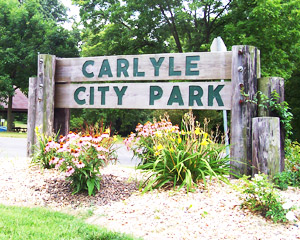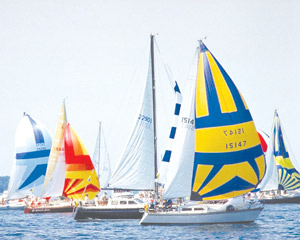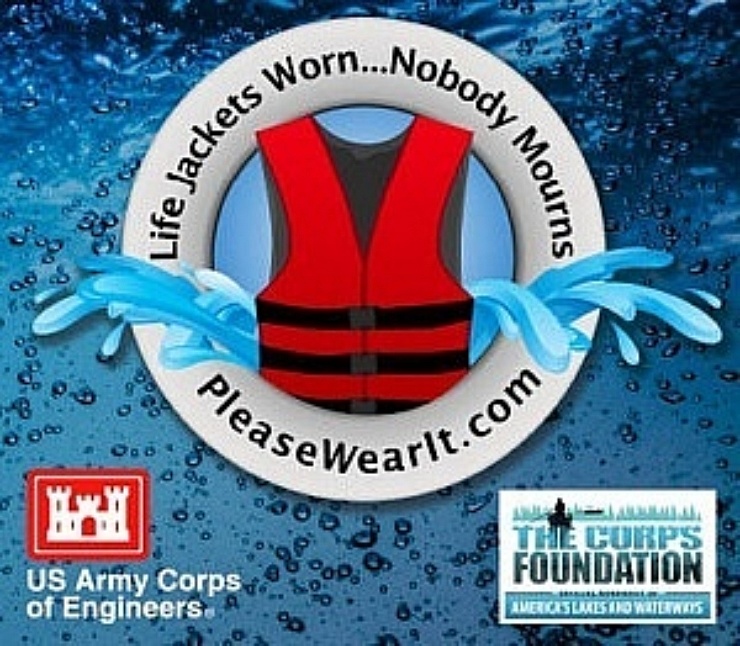Carlyle Lake Promotes Water Safety this Summer Season
Warmer weather is almost here and that means millions of Americans will be planning visits to our nation’s lakes and rivers. As the steward of many of these public waters, the U.S. Army Corps of Engineers reminds visitors of the importance of practicing safe, sensible, and thoughtful activities in and around the water.
Tragically, several people lose their lives while visiting USACE lands and waters every year. The majority of the tragedies are water-related. The public’s help is needed to reduce the number of fatalities at the more than 2,800 USACE-managed recreation areas nationwide. USACE personnel stress the importance of water safety year-round when talking with visitors, but especially during the summer season because that is when most public recreation fatalities occur.
People of all ages are strongly encouraged to practice water safety this summer. Before entering or being around the water, keep these five things in mind because they could save your life or the life of someone you care about.
- Expect the unexpected – Accidents can happen within seconds, so always be prepared for the unexpected. If you are ejected from a boat, fall, or jump into water that is colder than 70 degrees, you can inhale water from involuntary gasping, hyperventilation, panic, and sometimes vertigo that can cause you to drown. You can also be knocked unconscious if you are ejected from your boat or fall into the water along the shoreline while fishing.
- Wear a life jacket – By providing time to be rescued, it will help ensure you survive an unexpected fall into the water. It can also save your life if you become exhausted due to fatigue, waves, or current while swimming. An adult can drown in 60 seconds and it takes a strong swimmer 10 minutes to put on a life jacket after entering the water. Life Jackets Worn…Nobody Mourns.
- Know your swimming abilities – Be aware that swimming in natural waters such as a lake, river, or pond is different from swimming in a pool, and your swimming ability decreases with age. It is never too late to take swimming lessons and learn to swim well. Several people every year drown while swimming to retrieve boats and toys. Let those go because they are not worth losing your life over.
- Alcohol and water are a deadly combination – Alcohol induces an inner ear condition (caloric labyrinthitis) that can cause you to become disoriented when underwater and not realize which way is up. If you jump or fall in the water, you can become disoriented and swim down instead of up to safety, causing you to drown. This can more likely happen if you have been consuming alcohol.
- Understand “boater’s hypnosis” – It is a condition brought on by the effects of sun, wind, noise, vibration, and motion experienced during a day of boating. Boater’s hypnosis can slow your reaction time almost as much as if you were legally intoxicated. Adding alcohol to this condition intensifies the effects.
Learn more water safety tips by visiting www.PleaseWearIt.com and following Please Wear It on Facebook, Instagram, and Twitter.
In addition to water safety, USACE reminds all visitors, volunteers, and employees that a face mask is required in all USACE buildings and facilities to slow the spread of COVID-19. Masks should also be worn outdoors on USACE-managed lands when attending crowded events, and non-vaccinated individuals should wear masks outdoors when social distancing cannot be met, such as hiking on trails.
USACE is one of the nation’s leading federal providers of outdoor and water-based recreation, hosting millions of visits annually to its more than 400 lake and river projects. It’s estimated that 90 percent of the USACE-operated recreation areas are within 50 miles of metropolitan areas, offering diverse outdoor activities for all ages close to home. For more information on USACE recreation sites and activities, visit www.CorpsLakes.us.
For more information on water safety or Carlyle Lake, contact the Carlyle Lake Project Office at 618-594-2484 or email at carlylelake@usace.army.mil














